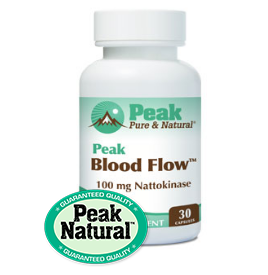Get Easy Health Digest™ in your inbox and don’t miss a thing when you subscribe today. Plus, get the free bonus report, Mother Nature’s Tips, Tricks and Remedies for Cholesterol, Blood Pressure & Blood Sugar as my way of saying welcome to the community!
Old test could give your doctor new insight into aspirin risk or benefit

Taking a low-dose daily aspirin has been widely accepted for decades due to its anti-clotting properties as an easy way to prevent a heart attack or a stroke. However, aspirin’s role as a safe preventative has been challenged over the last couple of years…
And that’s because, though daily aspirin use has been found to help some people, it also comes with a higher risk of bleeding.
In 2018, a mega study of more than 19,000 individuals published in three articles in The New England Journal of Medicine shocked both patients and physicians. They stated that daily low-dose aspirin, 100 milligrams or less, did not help older adults who did not have cardiovascular disease.
In response, the American Heart Association (AHA) and American College of Cardiology (ACC) updated their guidelines on aspirin therapy for prevention of cardiovascular disease based on a meta-analysis and three recent trials. They recommend:
- Low-dose aspirin might be considered for primary prevention of atherosclerotic cardiovascular disease (ASCVD) in select higher ASCVD adults aged 40-70 years who are not at increased bleeding risk.
- Low-dose aspirin should not be administered on a routine basis for primary prevention of ASCVD among adults older than 70 years.
- Low-dose aspirin should not be administered for primary prevention among adults at any age who are at increased bleeding risk.
But for the doctors who make these decisions, it hasn’t been so cut and dry on how to determine which patients could benefit from aspirin therapy — until now…
Help determining who benefits from aspirin therapy
According to Dr. Amit Khera, associate professor of medicine and director of the Preventive Cardiology Program at the University of Texas, Southwestern Medical School in Dallas, Texas, and an Associate of the Donald W. Reynolds Cardiovascular Clinical Research Center, “We used to say for aspirin, generally yes, occasionally no. With these new guidelines, we’ve flipped that on its head and are saying that we should not use aspirin for most people in primary prevention.”
However, he adds, “We need tools to find that sweet spot where aspirin is most beneficial and offsets the associated risks.”
Now, they may have found such a tool…
JAMA Cardiology reviewed findings that a standard X-ray test used to assess hardening of the arteries could help decide if the benefits of taking aspirin to prevent a first heart attack or stroke outweigh the risks of bleeding for its use.
A Coronary Artery Calcium (CAC) scan scores the amount of calcium lining the arteries of the heart and is used to detect the hardening of the arteries and the risk of a heart attack or stroke.
In the study, researchers gathered data from more than 6,000 adults in the Dallas Heart Study. The participants were invited to three visits for the collection of health and demographic information, laboratory samples and various imaging studies, including CAC scanning. Then they were followed for an average of 12 years to track heart attacks, deaths from heart disease, fatal and non-fatal stroke, cardiovascular disease or bleeding events that caused hospitalization or death.
«SPONSORED»
When Khera and his colleagues examined the rates of ASCVD and bleeding in the study group, they found that both events increased in a graded fashion as CAC scores rose.
However, when they used statistical modeling to see how many of the ASCVD events may have been prevented by aspirin use, they found that aspirin’s benefits only outweighed its risks for those with CAC scores above 100.
For this group, the risk of ASCVD was about fifteenfold and the bleeding risk about threefold of those with a CAC score of 0. But this effect only held for participants who already had an inherently low risk of bleeding. In other words, if someone had prior significant bleeding episodes, risk factors for bleeding, or was on medications that increase bleeding, they should not take aspirin for primary prevention regardless of their CAC score.
“Aspirin use is not a one-size-fits-all therapy,” says Khera, who holds the Dallas Heart Ball Chair in Hypertension and Heart Disease. “CAC scanning can be a valuable tool to help us tailor care to help more patients avoid a first heart attack or stroke.”
The take-away on aspirin
The bottom line here on aspirin therapy is that it is important to let your doctor make the decision, based on your medical history, on whether aspirin therapy would be beneficial for you. Taking your history under consideration, along with any diagnostics like a CAC scan, would help him or her make the best decision for you.
But there are plenty of good decisions you can make to help prevent cardiovascular disease as well…
Heart-healthy nutrition: Follow a heart-healthy diet like the DASH diet or the Pesco Mediterranean Diet. And have your doctor check your magnesium levels. According to Dr. Andrea Rosanoff, Director of Research & Science Information Outreach for the Center for Magnesium Education and Research, “Common risk factors for cardiovascular disease such as high LDL cholesterol, low HDL cholesterol, high blood pressure, and metabolic syndrome are all associated with low nutritional magnesium status or low magnesium dietary intakes.”
Exercise. Everyone, no matter age, should exercise. But to grab the highest levels of protection from heart disease and stroke once you pass the 60 mark, you have to exercise more than you did when you were younger. Try brisk walking, dancing, jogging or cycling — just make sure it’s something you enjoy so that it gets and keeps you moving.
Stay on top of your numbers: Cholesterol and blood pressure, especially. Both contribute to conditions that make it harder for your arteries to pump blood and that makes your heart work harder. And here is where a CAC scan may be helpful. But fatty plaque buildup should be something you strive to avoid instead of finding a high score. In addition to diet and exercise, look for nutrients that have been researched for their positive effect on artery health. For example, vitamin K2 is associated with inhibiting arterial calcification and arterial stiffening because it activates a protein that inhibits the deposits of calcium on vessel walls. You can read more here about why calcium score is a better measure of heart disease.
Editor’s note: There are perfectly safe and natural ways to decrease your risk of blood clots including the 25-cent vitamin, the nutrient that acts as a natural blood thinner and the powerful herb that helps clear plaque. To discover these and other secrets of long-lived hearts, click here for Hushed Up Natural Heart Cures and Common Misconceptions of Popular Heart Treatments!
Sources:
Aspirin use may be widespread despite new guidelines — NIH
Aspirin use best for those with high coronary calcium, low risk of bleeding — EurekaAlert!
Low Dose Aspirin Late in Life? Healthy People May not Need it — New York Times














